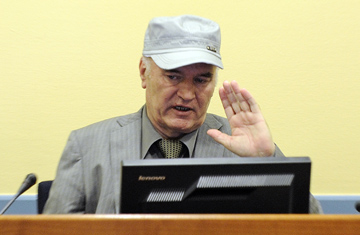
Former Bosnian Serb commander Ratko Mladic appears in court at the International Criminal Tribunal for the former Yugoslavia in the Hague on June 3, 2011
Defiant and unrepentant, former Bosnian Serb military commander Ratko Mladic made his first appearance at the International Criminal Tribunal for the Former Yugoslavia (ICTY) on Friday, June 3, in a preliminary hearing during which he refused to enter a plea to the 11 counts against him — including genocide, extermination and murder.
The once formidable general, stripped of his military uniform and wearing a dark gray suit, had to be supported by two United Nations guards and lowered into the defendant's seat in Courtroom One. He saluted the public gallery with his left hand — his right hand having been partially paralyzed, most likely from a stroke — and needed assistance putting on his translation headphones.
But if the man accused of committing the worst atrocities in Europe since World War II at first appeared to be a shell of his former self — even telling the three judges, in somewhat slurred speech, that he was a "gravely ill man" — his steely-eyed defiance quickly surfaced. When presiding judge Alphons Orie asked Mladic if he wanted to hear the charges against him, the former general replied, "I do not want to have a single letter or sentence of that indictment read out to me."
Judge Orie read the summary anyway, as much for the public record and to pay respect to the many victims of the Bosnian war as for Mladic (whom the judge didn't once address as General). The charges include genocide, extermination, murder and deportation, spanning the whole of the 1991–95 conflict, from the 44-month-long siege of Sarajevo to the 1995 hostage-taking of U.N. peacekeepers to the genocide at Srebrenica in July that same year, when some 8,000 Muslim men and boys were murdered over the course of five days.
Mladic listened intently as the charges were recited, often dabbing at his mouth or nose with a tissue, sometimes shaking his head no, including when the Srebrenica charges were read out. At one point, he even turned to smile at the public gallery. Sitting in the third row were a handful of war survivors who had traveled across Europe to see Mladic in the dock. Separated by bulletproof glass from the man they hold responsible for the deaths of their loved ones, some shouted, "Butcher!" and "Monster!" Others cried softly.
"When they arrested [Mladic], I felt O.K. about it," says Faroudin Alic, who survived the massacres at Srebrenica by escaping with a column of men through the forest to the safe town of Tuzla. "But now that I saw him, I feel worse. I can't explain why — it's just a strange feeling."
Strange was an apt word for Friday's arraignment, which ended with no pleas entered. Under the rules of the court, Mladic has 30 days to plead guilty or not guilty. He declared that he would take the allotted time, calling the charges "obnoxious" and saying he needed "more than a month [to read] these monstrous words, ones I've never heard before." The trial will reconvene in early July; if Mladic refuses to enter a plea then, the judges will enter a not-guilty plea for him.
During his testimony, the former general sent contradictory messages about the nature of his defense. At times he insisted, "I am defending myself, Ratko Mladic." But he also made references to his legal team. "That raised a lot of questions about how the trial is likely to proceed, particularly if he'll be representing himself," says Benjamin Ward, deputy director of Human Rights Watch's Europe and Central Asia division. "That will have the most significant bearing on the case and on how long it will take." ICTY prosecutors live constantly in the shadow of their failed attempt to convict former Serbian President Slobodan Milosevic, who died four years into his trial without a verdict ever being reached.
And now the court again finds itself hearing a case in which the defendant's health is a significant — and largely unknown — factor. Citing Mladic's privacy, tribunal officials have said only that he's getting routine examinations and that his lawyers in Belgrade are exaggerating his ill health. The topic was discussed in court behind closed doors at Mladic's request — through the glass partition, it was possible to see him moving his hands, attempting to touch the fingers of his right hand to his right thumb. Only his pinkie didn't seem able to connect.
As Friday's session wound down, however, Mladic reasserted his strength. "I don't want to be ... helped to move or to walk as if I was a blind man," he told the court. "I can walk on my own, and if I cannot, then I will ask to be helped, because I am General Mladic and the whole world knows who I am."
"I saw him in court exactly as I saw him that day in Srebrenica 16 years ago," says Bakira Hasecic, president of the Sarajevo-based Women Victims of the War organization. "He didn't change at all. He's still the big untouchable general, and we're so small."
Hasecic and a group of other mothers who survived the war met with chief prosecutor Serge Brammertz after the arraignment, reiterating their desire for a speedy procedure. Most of all, the women want Mladic to be in good health so the trial can continue — an irony not lost on Hasecic. "We're hoping to see him healthy, which is ridiculous," she says. "It's the opposite of what we should be asking for. But we want him to get justice."
